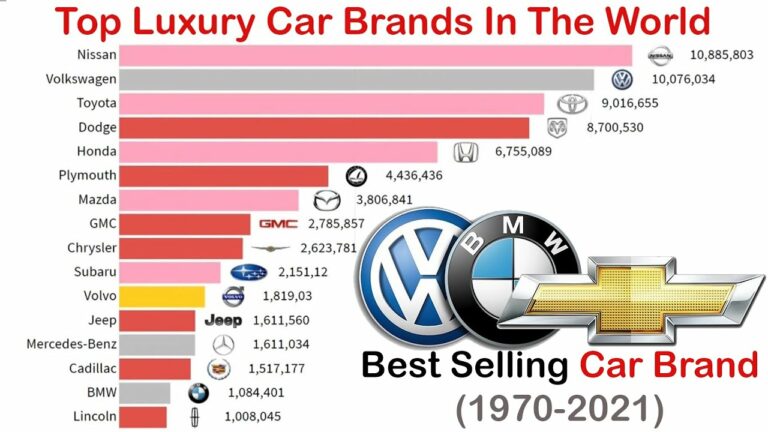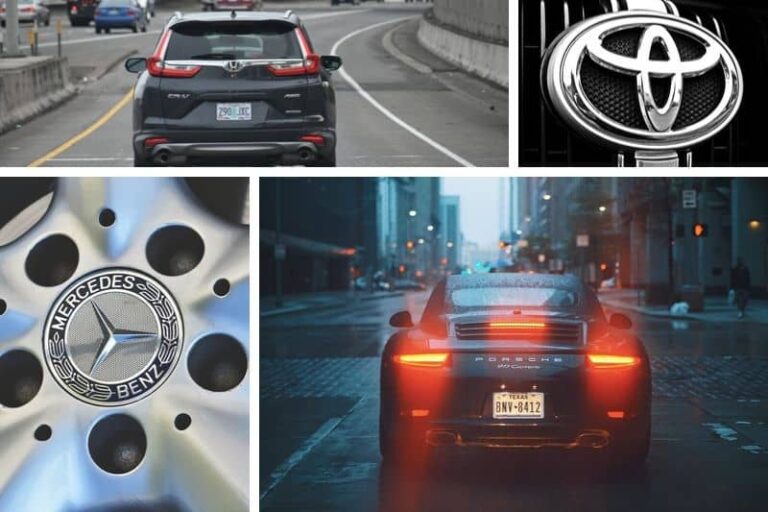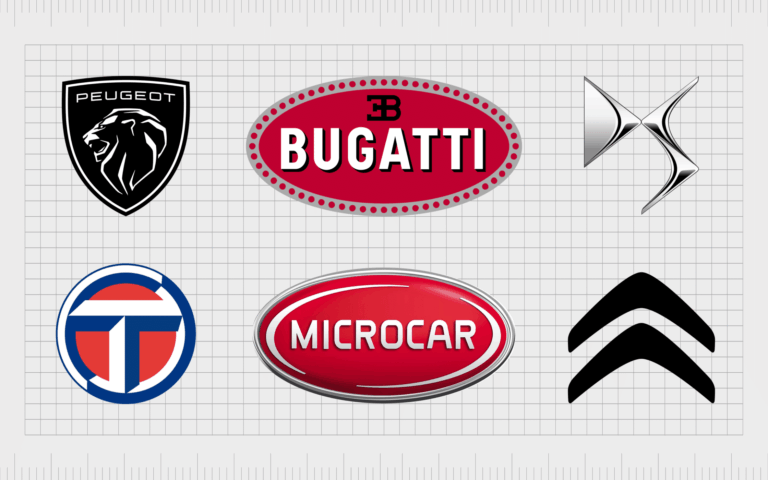Car Tire Brands List: Your Comprehensive Guide to Choosing the Right Rubber
Car Tire Brands List: Your Comprehensive Guide to Choosing the Right Rubber cars.truckstrend.com
The tires on your car are arguably its most critical component. They are the sole point of contact between your vehicle and the road, directly influencing everything from safety and braking performance to fuel efficiency, ride comfort, and overall handling. With such a vital role, choosing the right set of tires—and, by extension, the right tire brand—is a decision that merits careful consideration.
Far from being a commodity, tires are a marvel of engineering, packed with complex compounds, intricate tread patterns, and advanced construction techniques. The world of car tire brands is vast and diverse, populated by global giants with centuries of innovation, specialized performance manufacturers, and value-oriented producers. Understanding this landscape is the first step toward making an informed choice that aligns with your driving needs, vehicle type, and budget. This comprehensive guide will navigate you through the leading car tire brands, equipping you with the knowledge to make a confident decision for your next set of tires.
Car Tire Brands List: Your Comprehensive Guide to Choosing the Right Rubber
Understanding the Landscape of Car Tire Brands
The global tire market is dominated by a few major players, but a multitude of brands offer specialized products or cater to specific market segments. Generally, tire brands can be categorized into three tiers, each offering a distinct balance of performance, features, and price:
- Premium Brands: These are the industry leaders, investing heavily in research and development to produce cutting-edge technologies. They typically offer superior performance in areas like wet and dry grip, braking, fuel efficiency, longevity, and ride comfort. While they come with a higher price tag, they often deliver excellent long-term value and peace of mind.
- Mid-Range Brands: Offering a strong balance between performance and affordability, mid-range brands provide reliable quality that often approaches premium levels without the top-tier cost. They are an excellent choice for most everyday drivers seeking dependable performance and good value.
- Budget Brands: These brands focus on providing the most cost-effective solutions. While they meet safety standards, they may not offer the same level of refined performance, quietness, or longevity as their mid-range or premium counterparts. They are suitable for drivers with strict budget constraints or those who drive infrequently.
It’s important to note that many larger tire manufacturers own multiple brands across these tiers, allowing them to capture different market segments. For instance, Michelin owns BFGoodrich, and Bridgestone owns Firestone.

Key Factors When Choosing a Tire Brand
Before diving into specific brands, consider these crucial factors that will guide your selection:
- Vehicle Type: Sedans, SUVs, trucks, sports cars, and electric vehicles all have different tire requirements. A heavy SUV needs robust tires designed for load-bearing, while a sports car demands tires optimized for high-speed handling and grip.
- Driving Conditions & Climate: Do you primarily drive in a city, on highways, or off-road? Do you experience all four seasons, including heavy snow, or is your climate consistently mild? This dictates whether you need all-season, summer, winter, or all-terrain tires.
- Performance Needs: Are you prioritizing fuel efficiency, maximum grip for spirited driving, a quiet and comfortable ride, or extreme durability for commercial use? Different brands and tire lines within those brands specialize in these areas.
- Original Equipment (OE) Specifications: Your vehicle’s manufacturer spends significant resources selecting specific tires as original equipment. Checking your car’s manual for recommended tire sizes and types is a great starting point.
- Budget: While tempting to go for the cheapest option, remember that tires are a long-term investment in your safety and vehicle’s performance. Balancing cost with desired features is key.

Prominent Car Tire Brands: A Detailed Overview

Here’s a look at some of the most prominent and widely recognized car tire brands, highlighting their unique strengths and typical offerings:
- Michelin (France): A global leader, Michelin is synonymous with innovation, longevity, and premium performance. Known for their exceptional grip, fuel efficiency (Green X technology), and comfortable ride, Michelin tires are often original equipment on luxury and performance vehicles. They offer a vast range for passenger cars, SUVs, trucks, and high-performance applications.
- Bridgestone (Japan): The world’s largest tire manufacturer, Bridgestone is renowned for its durability, reliable performance, and extensive product line. They excel in all-season, touring, and truck/SUV tires, and are a major player in motorsports. Their Firestone subsidiary offers a more value-oriented option.
- Goodyear (USA): An iconic American brand with a long history of innovation, Goodyear offers a comprehensive range of tires known for their all-around performance. From long-lasting touring tires to aggressive truck tires and high-performance options, Goodyear is a versatile choice for a wide variety of vehicles and driving conditions.
- Continental (Germany): A European powerhouse, Continental is celebrated for its commitment to safety, advanced technology, and excellent braking performance. Their tires consistently perform well in independent tests for wet and dry grip, making them a top choice for drivers prioritizing safety and precision handling. They also own General Tire, a popular mid-range option.
- Pirelli (Italy): Synonymous with high-performance and luxury vehicles, Pirelli tires are engineered for precision handling, superior grip, and a sporty driving experience. They are often original equipment on high-end sports cars and exotics, and their presence in Formula 1 underscores their performance pedigree.
- Yokohama (Japan): Known for producing high-quality tires across various segments, Yokohama offers a strong balance of performance, durability, and value. They are particularly recognized for their excellent wet grip and performance tires, appealing to both everyday drivers and enthusiasts.
- Hankook (South Korea): A rapidly growing global brand, Hankook has carved out a strong reputation for offering excellent quality and performance at a competitive price point. They provide a wide array of tires for passenger cars, SUVs, and light trucks, often praised for their quiet ride and good handling.
- Cooper Tires (USA): A strong American brand, Cooper specializes in truck and SUV tires, including popular all-terrain and mud-terrain options. They are known for their robust construction, good warranties, and delivering solid performance and value, especially for those venturing off the beaten path.
- Falken (Japan): Part of the Sumitomo Rubber Industries group, Falken offers a compelling blend of performance and value, often featuring aggressive tread designs. They are popular among enthusiasts for their sport-performance tires and also provide reliable options for passenger cars and light trucks.
How to Choose the Right Tire Brand for Your Vehicle
Navigating the multitude of choices can be daunting. Here’s a practical approach to selecting the ideal tire brand:
- Consult Your Owner’s Manual: This is your primary resource. It specifies the original equipment tire size, load index, speed rating, and often recommends specific tire types (e.g., all-season, summer).
- Assess Your Driving Habits: Are you a daily commuter, a weekend adventurer, or a performance driver? Your driving style and environment dictate the type of tire you need.
- Read Reviews and Ratings: Websites like Tire Rack, Consumer Reports, and various automotive publications offer in-depth reviews, comparative tests, and user feedback. Pay attention to ratings for wet/dry traction, treadwear, noise, and comfort.
- Understand Tire Specifications (UTQG): The Uniform Tire Quality Grading (UTQG) system provides insights into:
- Treadwear: A comparative rating based on wear rate (higher number = longer lasting).
- Traction: Grades (AA, A, B, C) indicating a tire’s ability to stop on wet pavement.
- Temperature: Grades (A, B, C) indicating a tire’s resistance to heat generation.
- Seek Professional Advice: Visit a reputable tire dealer. They can assess your vehicle, driving needs, and budget to recommend suitable options from various brands.
- Consider Warranty and Road Hazard Protection: Many premium and mid-range brands offer mileage warranties (how long the tread is guaranteed to last) and sometimes road hazard protection (covering damage from potholes, nails, etc.). This can add significant value.
Beyond the Brand: Important Tire Specifications
While brand reputation is important, the specific tire model and its technical specifications are equally crucial. Always verify:
- Tire Size: E.g., 205/55R16. This must match your vehicle’s requirements.
- Load Index & Speed Rating: These numbers/letters indicate the maximum weight a tire can carry and the maximum speed it can safely sustain. Never use tires with a lower load index or speed rating than your vehicle’s specifications.
- Tread Pattern: Symmetric, asymmetric, and directional patterns are designed for different performance characteristics (e.g., directional for water evacuation, asymmetric for balanced wet/dry performance).
- Tread Compound: The rubber compound influences grip, wear, and fuel efficiency. Softer compounds offer better grip but wear faster; harder compounds last longer but may offer less grip.
Challenges and Solutions in Tire Brand Selection
- Challenge: Overwhelming Choices: The sheer number of brands and models can be paralyzing.
- Solution: Narrow down your options by first determining your tire type (all-season, winter, performance) and then setting a clear budget. This immediately eliminates many choices.
- Challenge: Balancing Price vs. Quality: Cheaper tires are tempting but might compromise safety or longevity.
- Solution: View tires as a long-term investment. While premium tires have a higher upfront cost, they often offer better fuel efficiency, last longer, and provide superior safety performance, potentially saving you money and headaches in the long run. Mid-range brands often strike an excellent balance.
- Challenge: Misinformation and Marketing Hype: Every brand claims to be the best.
- Solution: Rely on independent testing, certified reviews, and the advice of trusted tire professionals rather than just marketing claims.
Car Tire Brands List: Representative Price Tiers and Specialties
This table provides a generalized overview of prominent tire brands, their typical market positioning, and core strengths. Prices vary significantly based on tire size, type (e.g., performance vs. touring), and retailer.
| Brand Name | Origin | Typical Price Range | Key Strengths/Specialties | Target User |
|---|---|---|---|---|
| Michelin | France | Premium | Longevity, performance, fuel efficiency, comfort, innovation | Discerning drivers seeking top-tier quality |
| Bridgestone | Japan | Premium/Mid-Range | Durability, all-season performance, robust for trucks/SUVs | Drivers prioritizing reliability & long life |
| Goodyear | USA | Premium/Mid-Range | All-around performance, wide range, innovation | General drivers, SUVs, trucks, performance cars |
| Continental | Germany | Premium/Mid-Range | Safety, braking performance, advanced technology, quiet ride | Drivers valuing safety & cutting-edge tech |
| Pirelli | Italy | Premium | High-performance, luxury vehicles, motorsport heritage | Enthusiasts, luxury car owners |
| Yokohama | Japan | Mid-Range | Performance, all-season, good wet grip, value | Enthusiasts, everyday drivers |
| Hankook | South Korea | Mid-Range/Budget | Good value, all-season, growing reputation, diverse range | Budget-conscious drivers seeking quality |
| Cooper Tires | USA | Mid-Range | Truck/SUV tires, all-terrain, good warranties | Truck/SUV owners, off-road enthusiasts |
| Falken | Japan | Mid-Range | Performance, aggressive styling, good value | Performance car owners, tuners |
| Dunlop | UK/USA | Mid-Range | Sport performance, touring, good value | Drivers seeking sporty feel with good value |
| Toyo Tires | Japan | Mid-Range | Performance, truck/SUV, unique tread designs, enthusiast appeal | Performance-oriented drivers, truck/SUV owners |
| BFGoodrich | USA (Michelin) | Mid-Range/Premium | Off-road, all-terrain, truck tires, durable | Off-road enthusiasts, truck/SUV owners |
| Firestone | USA (Bridgestone) | Mid-Range | All-season, passenger cars, good value, widely available | Everyday drivers looking for reliable performance |
| General Tire | USA (Continental) | Budget/Mid-Range | All-season, light truck, good value, practical | Budget-conscious, truck/SUV owners |
| Nexen Tire | South Korea | Budget | Value, improving quality, diverse range | Entry-level, budget-conscious drivers |
Practical Advice and Actionable Insights
- Don’t Compromise on Safety: Tires are your primary safety feature. Investing in quality tires from a reputable brand pays dividends in accident avoidance.
- Research is Key: Don’t buy tires blindly. Use online resources, read reviews, and understand the specific features of the tire model you’re considering.
- Consider Long-Term Value: A cheaper tire might wear out faster or offer worse fuel economy, making it more expensive in the long run than a slightly pricier, more durable option.
- Proper Maintenance Extends Life: Regardless of the brand, regular tire rotations, proper inflation, and alignment checks are crucial for maximizing tire life and performance.
- Buy from Reputable Sources: Purchase tires from authorized dealers or well-known retailers to ensure authenticity and proper installation.
Frequently Asked Questions (FAQ)
Q1: Which car tire brand is the absolute "best"?
A1: There isn’t one single "best" brand for everyone. The best tire brand for you depends on your specific vehicle, driving conditions, performance needs, and budget. Michelin, Bridgestone, Goodyear, and Continental are consistently top-rated premium brands, but many others excel in specific niches.
Q2: Are more expensive tires always better?
A2: Generally, premium tires offer superior performance, longevity, and comfort compared to budget options due to advanced R&D and materials. However, a more expensive tire isn’t necessarily "better" if it doesn’t match your driving needs (e.g., a high-performance tire for a commuter car). Mid-range options often offer excellent value.
Q3: How often should I replace my tires, regardless of brand?
A3: Tires should be replaced when the tread depth reaches 2/32 inches (or the wear bars are visible). Additionally, most manufacturers recommend replacing tires after 6-10 years, even if they have adequate tread, as the rubber compounds can degrade over time due to age and exposure.
Q4: Can I mix different tire brands on my car?
A4: It is strongly recommended to avoid mixing tire brands, types, or tread patterns on your vehicle, especially on the same axle. Different tires can have varying grip levels, handling characteristics, and tread depths, which can negatively affect your vehicle’s stability, braking, and overall safety.
Q5: What do the numbers and letters on a tire’s sidewall mean?
A5: These indicate the tire’s size (e.g., 205/55R16), load index (maximum weight capacity), speed rating (maximum safe speed), and sometimes UTQG ratings (Treadwear, Traction, Temperature). Understanding these helps ensure you choose the correct tire for your vehicle.
Q6: How do I know if a specific tire model is right for my car?
A6: Always check your vehicle’s owner’s manual or the tire information placard (usually located on the driver’s side door jamb, glove compartment, or fuel filler door) for the recommended tire size, load index, and speed rating. Consult with a professional tire technician if you have any doubts.
Conclusion
Choosing the right car tire brand is a pivotal decision that directly impacts your safety, driving experience, and the longevity of your vehicle. By understanding the different tiers of brands, considering your specific driving needs, and leveraging available resources like reviews and professional advice, you can confidently select tires that offer the optimal balance of performance, durability, and value. Remember, tires are an investment, not just an expense. A well-chosen set from a reputable brand will provide reliable performance and peace of mind for thousands of miles to come, ensuring every journey is as safe and comfortable as possible.






